The odds may be stacked against independents at the moment, but sales, profits, store and staff numbers are all up. Beth Phillips looks at the main winners and losers
Independents never have it easy. This time last year, the sector was being challenged by energy price rises, greater employment regulation and increasing competition from multiples. Twelve months on and indies are facing up to further employment laws, a business rate increase, a cigarette display ban and increasing competition from multiples. Oh, and the small matter of an apocalyptic recession.
It's therefore no surprise to report that, in The Grocer's latest Top 50 ranking of independents, average profit margins of the 38 companies for which profit figures were obtainable rose from 2.2% in 2007 to 2.3% in 2008. And many of the results were filed before the economic downturn gathered pace last autumn.
But indies aren't ready to throw in the towel yet. While some are making defensive moves to see out the recession, others are continuing to forge ahead and expand their businesses into 2009, and beyond.
Drill the data down, however, and it is clear there are plenty of thriving indies out there, boosting both profit and turnover for the sector.
Overall sales, for example, were up in 38 of the companies on our list, rising 8% to £4.6bn.
Among those showing the most impressive growth was discount chain B&M Retail at number seven, which chalked up a 46% rise in turnover to £215m. "The growth is a result of our 28 store openings last year," says joint MD Simon Arora.
The top 10 performed consistently well, with Farmfoods the only company to record a drop in turnover. And even here, the latest available figures (for the year to December 2007) precede the frozen food discounter's dramatic sales uplift last year. Farmfoods recorded a 14.9% jump in sales in the 12 weeks to 25 January [TNS Worldpanel] and its share of the grocery market crept from 0.4% to 0.5% as it benefited from shoppers looking to save money.
Combined pre-tax profit for the 38 companies, meanwhile, was up 10%.
The highest profit margin, at 9.6%, was recorded by Wineflair. According to the latest accounts available from the Belfast Registry, the Northern Irish off-licence chain's profit jumped from £747,000 to £2.8m. This came after it closed eight stores and focused on its core off-licence business.
Not far behind was TJ Morris, which operates the discount chain Home Bargains, with a profit margin of 9%. The company's pre-tax profit, at £34m, was also the biggest profit recorded by any indie on the list, making up a third of the total £105.3m profit recorded by all companies.
"Business is as good as it's ever been for us," explains operations director Joe Morris. "We're set to open 30 stores within the next six months, an investment of approximately £15m. Although never complacent, we are confident the company will reach its goal of growing turnover to more than £1bn in the next eight years."
Rival discounter 99p Stores also had a great year, more than doubling its profit and dramatically increasing its store portfolio. The company's first inclusion in our Top 50 is a result of the rapid expansion of its core grocery offering, which stretches from food and drink through to health & beauty, laundry and household goods.
And store expansion is set to continue in 2009. "Although the collapse of sterling has been an issue, with all the high street closures we have managed to secure seven new sites in January alone," says commercial director Hussein Lalani.
The stigma once associated with discount stores is a thing of the past, he says. "When we first opened in 2001, our customers were hardened bargain hunters. Now they include professionals fed up with inflated supermarket prices.
"I believe the new customer base we have attracted will stay with us even if the economy makes a recovery. Once our customers realise they can save money on everyday household purchases, they will keep coming back."
Expansion
TJ Morris and 99p Stores aren’t the only companies with expansion on their minds. Store numbers were up 3% last year with 23 companies opening new stores. And despite the recession, of the 33 retailers who filled in our Top 50 survey, 23 said they were planning acquisitions this year.
Northern supermarket retailer Booths, for example, is planning to open two stores later this year. Maynews will open two sites in the next two months and Mills Group is planning six new stores.
The time is right to expand, says Martin Ashcroft, FD of forecourt operator Euro Garages, ranked sixth with sales up an impressive 45% to £231.5m. “Asking prices for new sites are starting to fall, which provides us with opportunities,” he says. “We plan to continue to develop our estate by extending and refurbishing retail space on site. We also plan to continue to acquire both trading and brownfield sites.”
John Ryeland, director of rival chain George Hammond, takes a similar view: “With no borrowing and low interest rates, we have the opportunity to develop existing sites and consider new acquisitions.”
While expansion is continuing, consolidation has slowed. Last year, five companies dropped out of the Top 50 after being acquired by rivals, but this year only one retailer, hospital c-store chain United News Shops, leaves the list due to acquisition, after being bought by WH Smith last March.
Brian Ford’s Discount Store is also absent from the list. In fact, it should never have been included in the first place. The one-store outfit was revealed in June to have been owned by Tesco since 2003. Tesco was forced to disclose it owned the shop after its plans to build a 60,000 sq ft store on the site were leaked to the media.
Other retailers have been selling to the multiples, but only in chunks. Curley’s Supermarkets remains on our list, despite Sainsbury's snapping up two of its stores in 2007. Long’s Supermarket remains fiercely independent, but has adopted Musgrave Group’s SuperValu fascia after struggling to secure suitable supply contracts.
The other new entrant in this year’s group ranking results from a disposal. At number 17 is off-licence chain Oddbins, which was acquired by management from Castel Group in August.
“2008 was challenging for all retailers, but the future is bright for Oddbins with new owners and increased focus on the brand and the range,” says marketing director Martin West. “We are confident we can overcome the challenges and return to the forefront of consumers’ minds.”
The darker side
For some retailers, however, 2008 was one challenge too many. Nearby Stores leaves the Top 50 after falling into administration in December when it ran out of cash.
Indeed, five companies on this year’s Top 50 recorded a loss, against just two the year before: Oddbins, Wine Cellar, G101 Off Sales, GT News and Cook.
Cook, at number 47 with a loss of £328,000 for the year to 31 March 2008, fell back into the red after reporting its first-ever profit in 2007. In its full-year accounts, published earlier this month, its auditors expressed concern over the company’s ability to continue as a going concern. But Cook is convinced things will improve following the opening of a £2.5m factory in Kent, which has the capacity to increase turnover from £14m in 2008 to £80m in the future.
“Our family has invested a further £1.5m in the business, which obviously puts Cook into significant positive net worth territory,” says founder Edward Perry. “We’re in the process of putting the finishing touches to a major new strategic initiative that we’ve been working on for a few months – one that will see us accelerate our growth significantly.”
Unlike their counterparts in The Grocer’s Big 30 league table of Britain’s wholesalers (The Grocer, 24 January), who were most concerned about pressure from the banks and a squeeze in credit last year, 75% of independent retailers worried about the economic climate and 52% feared the multiples, according to our survey.
These concerns look set to continue.
“We have four new multiples possibly opening within a five-mile radius in the next two years, the first being a Tesco, four miles away, in July,” says Andrew Faulks, partner at Stans Superstore, the only one-store business left on the Top 50.
Burgeoning legislation is also heaping pressure on business, independents claim, with 48% of retailers concerned about regulation. Staff numbers rose 12% in 2008 against 3% in 2007, though growth came largely from just a handful of retailers such as B&M Retail, J&J Wilson and 99p Stores.
“The cost of training staff to adhere to new licensing regulations, along with annual licence renewal fees, have increased overheads dramatically,” says Derrick Lloyd, managing director of J&J Wilson Shops. “More should be made of this.”
Extra costs and burdens
The Federation of Small Businesses agrees. It claims small businesses could be overwhelmed by new laws and has urged the Government to rethink. New and amended regulations come into force on 6 April and 1 October every year and laws set for this year include extending flexible working to parents of children up to the age of 16 and increasing staff holidays by four days. It is calling on the Government to reconsider the timing of each new law.
"This is no time to hold small businesses up with extra costs and burdens," says FSB national chairman John Wright. "In 2008, we saw 57 new or altered pieces of regulation affecting small companies. A similar number is expected this year. The small business sector is confident it can help pull us out of the recession. Suspending legislation that could cost small firms up to £800m will allow them to concentrate on getting the economy back on track."
Although the majority of indies are upbeat about their prospects for 2009, as the nation sinks further into recession it is unclear how many of our Top 50 will still be with us by the end of the year. The changing economic landscape may be an opportunity for some, but for others it will heap yet more pressure on a sector competing against the might of the multiples.
Independents never have it easy. This time last year, the sector was being challenged by energy price rises, greater employment regulation and increasing competition from multiples. Twelve months on and indies are facing up to further employment laws, a business rate increase, a cigarette display ban and increasing competition from multiples. Oh, and the small matter of an apocalyptic recession.
It's therefore no surprise to report that, in The Grocer's latest Top 50 ranking of independents, average profit margins of the 38 companies for which profit figures were obtainable rose from 2.2% in 2007 to 2.3% in 2008. And many of the results were filed before the economic downturn gathered pace last autumn.
But indies aren't ready to throw in the towel yet. While some are making defensive moves to see out the recession, others are continuing to forge ahead and expand their businesses into 2009, and beyond.
Drill the data down, however, and it is clear there are plenty of thriving indies out there, boosting both profit and turnover for the sector.
Overall sales, for example, were up in 38 of the companies on our list, rising 8% to £4.6bn.
Among those showing the most impressive growth was discount chain B&M Retail at number seven, which chalked up a 46% rise in turnover to £215m. "The growth is a result of our 28 store openings last year," says joint MD Simon Arora.
The top 10 performed consistently well, with Farmfoods the only company to record a drop in turnover. And even here, the latest available figures (for the year to December 2007) precede the frozen food discounter's dramatic sales uplift last year. Farmfoods recorded a 14.9% jump in sales in the 12 weeks to 25 January [TNS Worldpanel] and its share of the grocery market crept from 0.4% to 0.5% as it benefited from shoppers looking to save money.
Combined pre-tax profit for the 38 companies, meanwhile, was up 10%.
The highest profit margin, at 9.6%, was recorded by Wineflair. According to the latest accounts available from the Belfast Registry, the Northern Irish off-licence chain's profit jumped from £747,000 to £2.8m. This came after it closed eight stores and focused on its core off-licence business.
Not far behind was TJ Morris, which operates the discount chain Home Bargains, with a profit margin of 9%. The company's pre-tax profit, at £34m, was also the biggest profit recorded by any indie on the list, making up a third of the total £105.3m profit recorded by all companies.
"Business is as good as it's ever been for us," explains operations director Joe Morris. "We're set to open 30 stores within the next six months, an investment of approximately £15m. Although never complacent, we are confident the company will reach its goal of growing turnover to more than £1bn in the next eight years."
Rival discounter 99p Stores also had a great year, more than doubling its profit and dramatically increasing its store portfolio. The company's first inclusion in our Top 50 is a result of the rapid expansion of its core grocery offering, which stretches from food and drink through to health & beauty, laundry and household goods.
And store expansion is set to continue in 2009. "Although the collapse of sterling has been an issue, with all the high street closures we have managed to secure seven new sites in January alone," says commercial director Hussein Lalani.
The stigma once associated with discount stores is a thing of the past, he says. "When we first opened in 2001, our customers were hardened bargain hunters. Now they include professionals fed up with inflated supermarket prices.
"I believe the new customer base we have attracted will stay with us even if the economy makes a recovery. Once our customers realise they can save money on everyday household purchases, they will keep coming back."
Expansion
TJ Morris and 99p Stores aren’t the only companies with expansion on their minds. Store numbers were up 3% last year with 23 companies opening new stores. And despite the recession, of the 33 retailers who filled in our Top 50 survey, 23 said they were planning acquisitions this year.
Northern supermarket retailer Booths, for example, is planning to open two stores later this year. Maynews will open two sites in the next two months and Mills Group is planning six new stores.
The time is right to expand, says Martin Ashcroft, FD of forecourt operator Euro Garages, ranked sixth with sales up an impressive 45% to £231.5m. “Asking prices for new sites are starting to fall, which provides us with opportunities,” he says. “We plan to continue to develop our estate by extending and refurbishing retail space on site. We also plan to continue to acquire both trading and brownfield sites.”
John Ryeland, director of rival chain George Hammond, takes a similar view: “With no borrowing and low interest rates, we have the opportunity to develop existing sites and consider new acquisitions.”
While expansion is continuing, consolidation has slowed. Last year, five companies dropped out of the Top 50 after being acquired by rivals, but this year only one retailer, hospital c-store chain United News Shops, leaves the list due to acquisition, after being bought by WH Smith last March.
Brian Ford’s Discount Store is also absent from the list. In fact, it should never have been included in the first place. The one-store outfit was revealed in June to have been owned by Tesco since 2003. Tesco was forced to disclose it owned the shop after its plans to build a 60,000 sq ft store on the site were leaked to the media.
Other retailers have been selling to the multiples, but only in chunks. Curley’s Supermarkets remains on our list, despite Sainsbury's snapping up two of its stores in 2007. Long’s Supermarket remains fiercely independent, but has adopted Musgrave Group’s SuperValu fascia after struggling to secure suitable supply contracts.
The other new entrant in this year’s group ranking results from a disposal. At number 17 is off-licence chain Oddbins, which was acquired by management from Castel Group in August.
“2008 was challenging for all retailers, but the future is bright for Oddbins with new owners and increased focus on the brand and the range,” says marketing director Martin West. “We are confident we can overcome the challenges and return to the forefront of consumers’ minds.”
The darker side
For some retailers, however, 2008 was one challenge too many. Nearby Stores leaves the Top 50 after falling into administration in December when it ran out of cash.
Indeed, five companies on this year’s Top 50 recorded a loss, against just two the year before: Oddbins, Wine Cellar, G101 Off Sales, GT News and Cook.
Cook, at number 47 with a loss of £328,000 for the year to 31 March 2008, fell back into the red after reporting its first-ever profit in 2007. In its full-year accounts, published earlier this month, its auditors expressed concern over the company’s ability to continue as a going concern. But Cook is convinced things will improve following the opening of a £2.5m factory in Kent, which has the capacity to increase turnover from £14m in 2008 to £80m in the future.
“Our family has invested a further £1.5m in the business, which obviously puts Cook into significant positive net worth territory,” says founder Edward Perry. “We’re in the process of putting the finishing touches to a major new strategic initiative that we’ve been working on for a few months – one that will see us accelerate our growth significantly.”
Unlike their counterparts in The Grocer’s Big 30 league table of Britain’s wholesalers (The Grocer, 24 January), who were most concerned about pressure from the banks and a squeeze in credit last year, 75% of independent retailers worried about the economic climate and 52% feared the multiples, according to our survey.
These concerns look set to continue.
“We have four new multiples possibly opening within a five-mile radius in the next two years, the first being a Tesco, four miles away, in July,” says Andrew Faulks, partner at Stans Superstore, the only one-store business left on the Top 50.
Burgeoning legislation is also heaping pressure on business, independents claim, with 48% of retailers concerned about regulation. Staff numbers rose 12% in 2008 against 3% in 2007, though growth came largely from just a handful of retailers such as B&M Retail, J&J Wilson and 99p Stores.
“The cost of training staff to adhere to new licensing regulations, along with annual licence renewal fees, have increased overheads dramatically,” says Derrick Lloyd, managing director of J&J Wilson Shops. “More should be made of this.”
Extra costs and burdens
The Federation of Small Businesses agrees. It claims small businesses could be overwhelmed by new laws and has urged the Government to rethink. New and amended regulations come into force on 6 April and 1 October every year and laws set for this year include extending flexible working to parents of children up to the age of 16 and increasing staff holidays by four days. It is calling on the Government to reconsider the timing of each new law.
"This is no time to hold small businesses up with extra costs and burdens," says FSB national chairman John Wright. "In 2008, we saw 57 new or altered pieces of regulation affecting small companies. A similar number is expected this year. The small business sector is confident it can help pull us out of the recession. Suspending legislation that could cost small firms up to £800m will allow them to concentrate on getting the economy back on track."
Although the majority of indies are upbeat about their prospects for 2009, as the nation sinks further into recession it is unclear how many of our Top 50 will still be with us by the end of the year. The changing economic landscape may be an opportunity for some, but for others it will heap yet more pressure on a sector competing against the might of the multiples.
CTNs
CTN retailers have diversified their offer to mitigate the effect of factors such as falling confectionery sales in the independent sector, plans to ban tobacco displays and the decline of newspaper and magazine circulations. Newsplus Group, for example, opened a concept store in December offering coffee, freshly baked pastries and an extended alcohol section. Rippleglen, meanwhile, is trialling a convenience offer.
All CTN businesses in our Top 50 reported an increase in sales, although profits suffered. Profit fell at Rippleglen and Mills Group and was flat at Newsplus. GT News, however, reduced its loss from £155,322 in 2007 to just £19,047.
CTN retailers have diversified their offer to mitigate the effect of factors such as falling confectionery sales in the independent sector, plans to ban tobacco displays and the decline of newspaper and magazine circulations. Newsplus Group, for example, opened a concept store in December offering coffee, freshly baked pastries and an extended alcohol section. Rippleglen, meanwhile, is trialling a convenience offer.
All CTN businesses in our Top 50 reported an increase in sales, although profits suffered. Profit fell at Rippleglen and Mills Group and was flat at Newsplus. GT News, however, reduced its loss from £155,322 in 2007 to just £19,047.
Forecourts
Of the five pure forecourt retailers in this year's Top 50, four reported turnover up, with sales of Euro Garages up 45% to £232m. With fuel prices peaking last summer, independents had to stand out to attract customers. Stans Superstore sold what it claimed was the cheapest fuel in Britain, while Snax 24 ventured into the US, striking up a partnership with a c-store chain at two forecourts in Pittsburgh and Cleveland.
Such innovation is set to continue. In May, James Graven & Sons will become the first independent retailer in the UK to run an M&S Simply Food offer at its BP forecourt in Ely, Cambridgeshire. Snax 24, meanwhile, is aiming to boost turnover by scaling down its grocery offer and focusing on fuel sales.
Of the five pure forecourt retailers in this year's Top 50, four reported turnover up, with sales of Euro Garages up 45% to £232m. With fuel prices peaking last summer, independents had to stand out to attract customers. Stans Superstore sold what it claimed was the cheapest fuel in Britain, while Snax 24 ventured into the US, striking up a partnership with a c-store chain at two forecourts in Pittsburgh and Cleveland.
Such innovation is set to continue. In May, James Graven & Sons will become the first independent retailer in the UK to run an M&S Simply Food offer at its BP forecourt in Ely, Cambridgeshire. Snax 24, meanwhile, is aiming to boost turnover by scaling down its grocery offer and focusing on fuel sales.
Supermarkets
The 14 independent supermarkets in the Top 50 had mixed fortunes.
Sales fell in eight of them and profits were down in three. For some, such as Proudfoot Group, Curley's Supermarket and Roys, it was a case of store closures hitting sales, but for others it was a mix of the downturn and pressure from the multiples.
"The way the multiples have been advertising in the national press has had an effect on our margin," says Andrew Faulks, partner at Stans Superstore.
Top of the pile was Booths, ranking fifth with sales up 6% to £244m and profit up 33% to £6.9m. It is competing with the multiples by stocking tertiary brands and running 50p price promotions.
The 14 independent supermarkets in the Top 50 had mixed fortunes.
Sales fell in eight of them and profits were down in three. For some, such as Proudfoot Group, Curley's Supermarket and Roys, it was a case of store closures hitting sales, but for others it was a mix of the downturn and pressure from the multiples.
"The way the multiples have been advertising in the national press has had an effect on our margin," says Andrew Faulks, partner at Stans Superstore.
Top of the pile was Booths, ranking fifth with sales up 6% to £244m and profit up 33% to £6.9m. It is competing with the multiples by stocking tertiary brands and running 50p price promotions.
Off-licences
For well-run off-licences, the recession is probably more an opportunity than a threat.
Of course, the poor economic outlook is prompting consumers to tighten their belts, and there is tough competition from the multiples promoting booze more heavily than ever before. Just ask Nick Baile, who is tasked with turning the fortunes of Oddbins around after taking the chain off the hands of Castel last August. But there are positives, people are eating out less and are more likely to drink at home. And, traditionally, alcohol sales do well during an economic slump.
Winemark is showing it is possible to compete with the mults, and R&M Swaine says it plans to open between five and 10 more Rhythm & Booze stores this year.
For well-run off-licences, the recession is probably more an opportunity than a threat.
Of course, the poor economic outlook is prompting consumers to tighten their belts, and there is tough competition from the multiples promoting booze more heavily than ever before. Just ask Nick Baile, who is tasked with turning the fortunes of Oddbins around after taking the chain off the hands of Castel last August. But there are positives, people are eating out less and are more likely to drink at home. And, traditionally, alcohol sales do well during an economic slump.
Winemark is showing it is possible to compete with the mults, and R&M Swaine says it plans to open between five and 10 more Rhythm & Booze stores this year.
C-stores
Most independent convenience stores are coping well despite the gloom, with more retailers reporting sales and profit growth than those reporting declines. Strong performers include many Spar retailers, including Tates, Henderson Retail, Gilletts and Lawrence Hunt, which should be helped further in the coming year when the group revamps its own-label lines.
C-store and CTN giant Martin McColl also thrived, no doubt benefitting from its deal with Palmer & Harvey McLane. J&J Wilson, which owns 51 stores in UK holiday destinations, put its success down to Costcutter's promotions and is set to benefit as a weak sterling encourages more people to holiday in the UK.
Most independent convenience stores are coping well despite the gloom, with more retailers reporting sales and profit growth than those reporting declines. Strong performers include many Spar retailers, including Tates, Henderson Retail, Gilletts and Lawrence Hunt, which should be helped further in the coming year when the group revamps its own-label lines.
C-store and CTN giant Martin McColl also thrived, no doubt benefitting from its deal with Palmer & Harvey McLane. J&J Wilson, which owns 51 stores in UK holiday destinations, put its success down to Costcutter's promotions and is set to benefit as a weak sterling encourages more people to holiday in the UK.
Discounters
2008 was the year of the discounter. As the economy nosedived, Aldi, Lidl and Netto attracted more customers – as did their independent counterparts. Of the six discounters listed in the Top 50, all bar B&M Retail reported double or triple-digit profit increases. Profit margins hit a huge 9% at TJ Morris, which operates as Home Bargains.
All retailers aggressively expanded their operations, opening new stores and taking on more staff. TJ Morris and 99p Stores have pledged to continue this into 2009.
99p Stores expects to create 1,000 jobs through the opening of 30 new stores, while TJ Morris claims that, after investing £35m in expanding its Liverpool distribution centre, it could support up to 350 stores in the future.
2008 was the year of the discounter. As the economy nosedived, Aldi, Lidl and Netto attracted more customers – as did their independent counterparts. Of the six discounters listed in the Top 50, all bar B&M Retail reported double or triple-digit profit increases. Profit margins hit a huge 9% at TJ Morris, which operates as Home Bargains.
All retailers aggressively expanded their operations, opening new stores and taking on more staff. TJ Morris and 99p Stores have pledged to continue this into 2009.
99p Stores expects to create 1,000 jobs through the opening of 30 new stores, while TJ Morris claims that, after investing £35m in expanding its Liverpool distribution centre, it could support up to 350 stores in the future.
The weird, wonderful world of indies
A retailer of culture
Liverpool-based discount chain Home Bargains hired some unusual new recruits last summer - 17 of the 60 Superlambanana statues created by artists in Liverpool to celebrate the city's status as European Capital of Culture 2008. The sculptures have become something of an icon in Merseyside. Home Bargains owner TJ Morris now uses them to bring a slice of Liverpool to new store openings and loans them to local schools.
Tuffins bags a bear
When Harry Tuffins launched its new bag for life in December, the Shropshire-based retailer wanted everyone to know about it. It commissioned wood sculptor Andy Hancock to replicate the design on the bag - resulting in a life-size sculpture of a polar bear and cub sitting outside its Churchstoke store. And the bear is doing its job - Tuffins is selling 2,500 bags for life a week.
Epicurean's war on waste
Andrew Thornton, owner of The Local Epicurean, is a trailblazer. Last year he introduced two new recycling initiatives to his stores: bins by checkouts so customers can ditch excess packaging and a scheme that produces electricity from recycled food waste.
Anything you can do...
As the credit crunch accelerated last summer, Asda and Morrisons launched a fierce price war, slashing the cost of a selection of products to just 50p. Not to be outdone, upmarket supermarket chain Booths followed suit with its 50p Price Guarantee on five different vegetables and salads every fortnight in its 26 stores. Booths says the promotion prompted a significant uplift in volume.
...we can do better
In September, as fuel prices rocketed, single-store business Stans Superstore launched an audacious attack on the multiples by selling what it claimed was the cheapest fuel in Britain. The retailer slashed 4p off the price of a litre of unleaded petrol and offered a further 7p discount if customers spent £50 in store, bringing the cost of a litre of unleaded petrol down to just 99.9p.
A retailer of culture
Liverpool-based discount chain Home Bargains hired some unusual new recruits last summer - 17 of the 60 Superlambanana statues created by artists in Liverpool to celebrate the city's status as European Capital of Culture 2008. The sculptures have become something of an icon in Merseyside. Home Bargains owner TJ Morris now uses them to bring a slice of Liverpool to new store openings and loans them to local schools.
Tuffins bags a bear
When Harry Tuffins launched its new bag for life in December, the Shropshire-based retailer wanted everyone to know about it. It commissioned wood sculptor Andy Hancock to replicate the design on the bag - resulting in a life-size sculpture of a polar bear and cub sitting outside its Churchstoke store. And the bear is doing its job - Tuffins is selling 2,500 bags for life a week.
Epicurean's war on waste
Andrew Thornton, owner of The Local Epicurean, is a trailblazer. Last year he introduced two new recycling initiatives to his stores: bins by checkouts so customers can ditch excess packaging and a scheme that produces electricity from recycled food waste.
Anything you can do...
As the credit crunch accelerated last summer, Asda and Morrisons launched a fierce price war, slashing the cost of a selection of products to just 50p. Not to be outdone, upmarket supermarket chain Booths followed suit with its 50p Price Guarantee on five different vegetables and salads every fortnight in its 26 stores. Booths says the promotion prompted a significant uplift in volume.
...we can do better
In September, as fuel prices rocketed, single-store business Stans Superstore launched an audacious attack on the multiples by selling what it claimed was the cheapest fuel in Britain. The retailer slashed 4p off the price of a litre of unleaded petrol and offered a further 7p discount if customers spent £50 in store, bringing the cost of a litre of unleaded petrol down to just 99.9p.







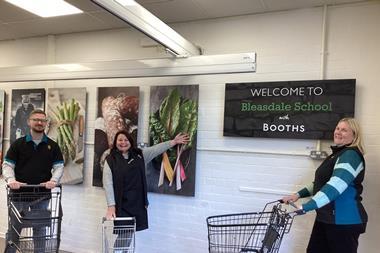
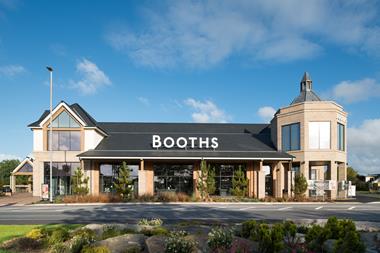
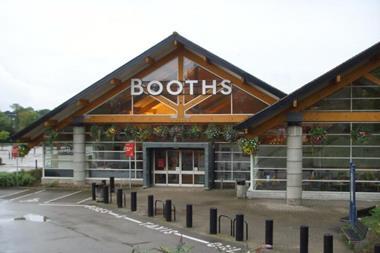
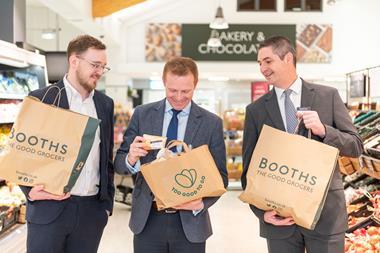
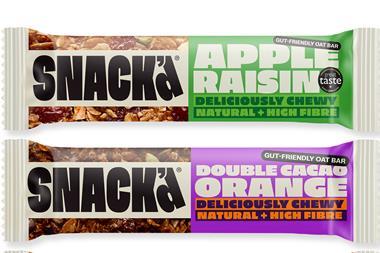
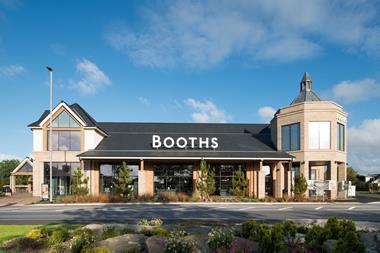






No comments yet